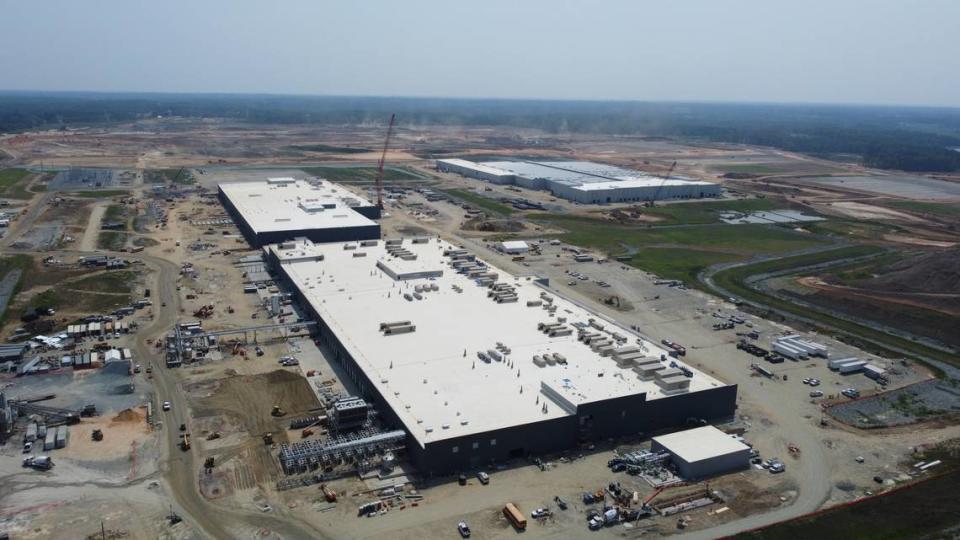With Toyota’s help, NC is US leader in recent electric vehicle industry investments
North Carolina has led the country in new electric vehicle manufacturing and battery supply chain investments since August, according to a new report from the Environmental Defense Fund.
North Carolina has added $8.9 billion in new investments in the electric vehicle sector since the environmental non-profit and consulting firm WSP last updated the numbers in August 2023, leading the United States over that period.
Companies have announced $19.2 billion in total EV or battery manufacturing projects in North Carolina in recent years, only trailing Georgia and auto manufacturing hub Michigan.
The battery manufacturing plant Toyota is building in Liberty, just west of Greensboro, is responsible for much of North Carolina’s total battery manufacturing growth since August. Toyota in October announced it would invest an additional $8 billion into the project, adding eight battery lines for hybrid and electric vehicles and bringing its total investment to $13.9 billion.
North Carolina is also seeing investment follow the large-scale project announcements by Toyota and Vietnamese electric vehicle maker VinFast, Ellen Robo, an author of the report and manager of EDF’s transportation and clean air policy team, said in an interview.

“You start building up the facilities in the state and then they want their component manufacturers to be close by, as well, or there’s incentives for other facilities to locate geographically close to where there’s an EV manufacturing hub dynamic,” Robo said.
Since August, North Carolina has added:
Epsilon Advanced Materials, which plans to employ 500 people at the $650 million Brunswick County site where it plans to produce graphite components for EV batteries.
Forge Nano, which plans to invest more than $165 million and employ about 200 people at a Morrisville plant where it plans to produce lithium-ion batteries that the company says uses a specialized coating to stay usable longer and increase battery performance.
Fujihatsu and Toyotsu’s $60 million investment for a new facility near Toyota’s Liberty plant that will employ about 130 people making and selling aluminum cell cases and cell covers for automotive and electric vehicle batteries. A February press release announcing the project said it will “support” Toyota’s plant.
“With a world-class manufacturing workforce and a strong reputation as a clean tech industry leader, North Carolina is in a strong position to press its competitive advantages. My thought is that we’re seeing the advantages of that, we’re seeing those benefits,” David Kelly, EDF’s North Carolina state director, said in an interview.
There could be more to come. Speaking at the Conservatives for Clean Energy’s Clean Energy Champions event in November, Christopher Chung, chief executive officer of the N.C. Economic Development Partnership, said North Carolina had 250 active economic development recruitment efforts and that about 35 of those were either in electric vehicles or an adjacent sector.
“Clean energy is here because the private sector economy believes that is where the world is heading and that is where their customers want to be in the coming years,” Chung said in a speech.
Inflation Reduction Act impacts
The new report points to 2022’s Inflation Reduction Act as an inflection point for battery manufacturing in the United States. Since the bill passed in August 2022, manufacturers have committed more than $100 billion to new projects in electric vehicles or batteries nationwide.

“There is a lot of reason to think that the incentives within the Inflation Reduction Act are succeeding at motivating on-shoring of this sort of domestic manufacturing renaissance,” Robo said.
The Inflation Reduction Act offers consumers tax credits of up to $7,500 for people who make less than $150,000 or couples who make less than $300,000 who purchase an EV. For the vehicle to qualify for the credit, though, 50% of the total value of critical minerals used in its must from the United States or a county that has a free trade agreement, and 60% of the components used in its battery must be manufactured or assembled in the United States.
Both of those qualifications will steadily rise throughout the 2020s, reaching 80% of the total value of critical minerals by 2027 and 100% of battery manufacturing in the United States by 2029.
Manufacturers can also claim tax credits for battery production that effectively equal a little more than a third of the cost of battery production. The Inflation Reduction Act established Tax Credits of $35 per kilowatt hour for battery cells made in the United States and $10 per kilowatt hour for domestically produced battery modules.
Making a lithium-ion battery pack costs $139 per kilowatt hour, BloombergNEF reported in November. That means manufacturers can reclaim nearly a third of the cost of domestically produced batteries in the form of tax credits.
By 2027, manufacturers will be capable of producing 5.5 million new electric vehicles annually in the United States, according to the EDF report. They will also be capable of making batteries that can power as many as 16.6 million new EV passenger vehicles.
Consumers lagging behind?
The short-term future for electric vehicles seemed to grow hazier over the last year as customer demand came in lower than expected, causing some companies to either scale back their workforces or scrap plans.
That had impacts in North Carolina, including layoffs at Charlotte-based lithium mining company Albemarle, which shelved plans for two Charlotte-area projects earlier this year to save $750 million as demand for electric vehicles slowed.
Transportation remains North Carolina’s largest source of greenhouse gas emissions, with a N.C. Department of Environmental Quality report finding that cars and trucks throughout the state sending 50.35 million metric tons of greenhouse gases into the atmosphere in 2020. That’s about 36% of the state’s emissions, a quantity DEQ expects to remain relatively consistent even as far out as 2050.
Still, Kelly said the overall trend both in the state and nationally, shows that auto manufacturers are committed to moving from internal combustion engines to electric transportation options.
“These companies making these investments recognize there’s a growing segment of customers interested in these products and the investments that we’re seeing are responding to that demand as businesses compete for as large a share of that market that they can get,” Kelly said.
This story was produced with financial support from the Hartfield Foundation and Green South Foundation, in partnership with Journalism Funding Partners, as part of an independent journalism fellowship program. The N&O maintains full editorial control of the work. If you would like to help support local journalism, please consider signing up for a digital subscription, which you can do here.


